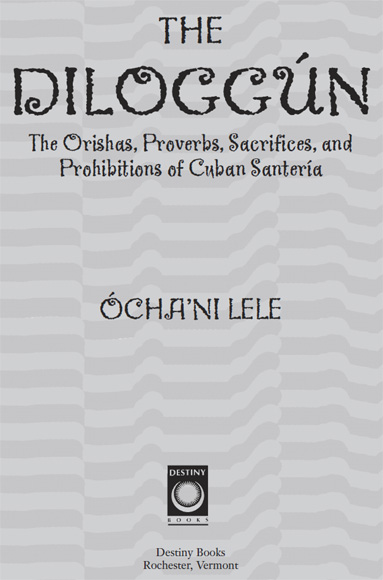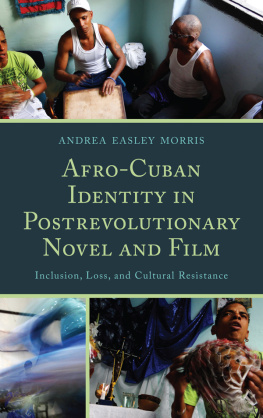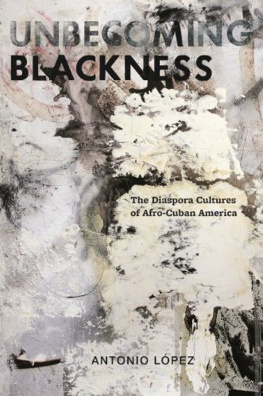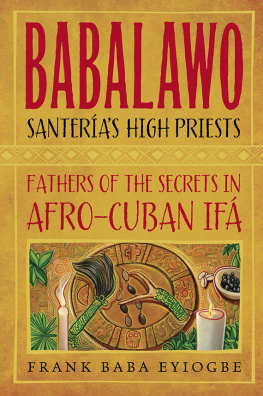

For Ogndei, Evaristo Perez, iba. We all miss you.
For Cynthia Perry. Thank you for believing in me.
For my godfather, Banacek Matos. Thank you...
for everything you gave me.
ACKNOWLEDGMENTS
It is said that Oldumare spread his knowledge and wisdom throughout the world so that each person could have a small part. Since 1989 I have immersed myself in the culture of orisha worship, and no matter how much I learn I realize that there is so much more to be learned. A book as vast as this represents countless hours of travel, questioning, study, note taking, and work. I am indebted to the many people who have encouraged, supported, and instructed me; I need to acknowledge them all here.
I am indebted to those who gave me my foundation in the religion, setting me on the path that led to the completion of my research: Auria Gonzalez (omo-Oshn), Rigoberto Rodriguez (omo-Oshn, iba), and Juan Gonzalez (omo-Yemay, iba), gentle tutors who taught me the basic oral meanings of the parent odu and their special rituals. To my many sponsors and godparents in the religion, I am always in your debt: my first godmother, Baba Lade; my first yubonna, Odofemi; and my ex- and onetime oriat, Afolabi. Although I am no longer a godchild in that house, the training and teaching that I received as I was given my elekes, warriors, Olokun, Ibeyi, santo lavado (Obatal), and nganga (the cauldron of Palo Mayombe) were instrumental in this volumes research. I spent many months in Michigan questioning, observing, and learning; it was through participation in that il ocha that I learned the manipulations of ob and diloggn, the oracles of the orishas. I also need to thank Akin Babatunde, Ogndei (iba), Paul Bennet, Reynaldo Ruiz, Omolotiwa, Dr. Mary Curry (iba), and Christine Jaffe for all their support and help throughout these writing projects. Special thanks and love also go out to Omolotiwa, Oshunguere, Oshunare, and Adeobe for accepting me with open arms when I literally showed up on their front doorstep. Thank you! You have all been the most incredible and gracious hosts!
Although Palo Mayombe is a religion separate from Lucum practice, my experiences in this Congolese faith were instrumental to my spiritual development and, hence, my work as an author. I need to thank all those in my munanso who gave me foundation and initiation: my Tata, Tiembla Tierra Sambia Empungo (Banacek Matos); my Yayi, Chola Cuatro Vientos (Keisha Lago); and the witnesses to my rayado, Lucero Malembo Malongo, Lucero Tata Entoto, Siete Sayas Sirena de Madrugada (Dr. Miriam Bonet), and Matojo que Crece. They gave me strength when I felt that I had none, courage when I was afraid, and foundation when the very walls around me were crumbling. How can I thank these people enough for giving me back my life? I cannot. I also need to thank Eva Shang (Obadeoba), an espiritista with the most incredible egun and muertos, for helping me give my own spiritual court strength, light, and elevation. Her work as an espiritista is incredible, and I owe my own spiritual development as an espiritista to much of her work. Elba Oshn (Oniosn), her partner in the religion, has been very sweet and very kind, and I thank her for her work as well in elevating my spiritual court. Finally, I need to thank Naomi Alejandro (siete rayos), Madre Nganga from the rama Vititi Congo, for her many hours of visits and discussions on the religion Palo Mayombe. She was a fountain of knowledge, one that I drank from quite frequently.
I also want to thank the following people for their support over the years:
- Susannah Noel, the editor for my first book, The Secrets of Afro-Cuban Divination. I learned so much by working with her on my first major project. Susannah, you have no idea how your ripping and shredding of my first manuscript molded my work to date as an author. Just dont do it againever!
- Doris Troy, the editor for my second book Ob, Oracle of Cuban Santera. She picked up where Susannah left off and helped my writing acquire the final bit of polish it needed. Doris, you did a beautiful job with that volume, and I thank you for it!
- Laura Schlivek, my project editor throughout all my work with Inner Traditions. Laura, you are incredible, providing me with encouragement and motivation when I am about to give up. Thank you for your mentoring.
- Jon Graham, my acquisitions manager at Inner Traditions. When no one else there believed in my proposals, you did, and I am grateful for your belief in my work. I am sure that the orishas thank you as well for ensuring that the beauty and complexity of our faith is out there for the world to read about and understand.
- Nancy Ringer, who attacked and edited this project with an almost religious zeal. You did a wonderful job, Nancy.
- Cynthia Perry, my benefactor and patron, the one person who believed in me and my work so much that she was willing to give up everything to ensure that my dreams came true. Cindy, how can I thank you for being there when times were rough? How can I thank you for continuing to push me toward my dreams and goals? I cannot. But at least you know that you have my undying love and gratitude.
- Mark Benezra, owner of Original Publications, for allowing me to quote freely from Aw FLokun Fatunmbis Aw: If and the Theology of Orisha Divination. As always, on a personal level I must thank him for his time and encouragement early in my writing career. The man is nothing short of brilliant, and he was, in the day, a cherished mentor.
- Marjorie Stevens and Ann Refoe, two teachers who realized that I had talent as a writer and encouraged me to write feverishly. Teachers are the most important influence in our lives, and they can never be given enough praise. To both of you, know that whenever my pen hits paper, you are both there in my prayers and thoughts.
The blessings and love that I have to give go out to you all. I thank each of you for believing in me when I did not believe in myself. Ach! To all of you!
AN INTRODUCTION
TO THE LUCUM RELIGION
Although the Lucum faith is a modern religion flourishing on American soil, it is heavily rooted in the past, a surviving spiritual evolution of ancient Yoruba beliefs. The Yoruba were a proud nation of warriors who occupied southwestern Nigeria, an area in which their modern-day descendants still thrive. These Africans developed a religious city-state system whose brilliance in some ways exceeded that of the classical Greek and Roman empires, for while those ancient European civilizations are no more, the Yoruba culture lives on. History tells us that the Yoruba nation was founded by a holy man, Odduwa, who established the first holy city at Il If. As the ethnic group spread, entire city-states sprang up around the worship of various orishas, or gods. Il If belonged to Obatal, Oy to Shang, Ilobu to Inle, Ketu to Ochosi, Inisa to Otn, and Ilesa (Ijesa region, Iwo and Edo) to Logun Ede. Each city-state had its own priesthood devoted to the orisha protecting the city. Thus, initiates in Il If were brought into the mysteries of Obatal, whereas those who entered the priesthood in Oy received Shang, and Ketu priests were bound to Ochosi. Uniting all these city-states, no matter the god served, were three concepts: Odduwa, the common ancestor; Eleggu, the orisha who opens the doors from our world to that of the divine; and Oldumare, the supreme god. While the people of each individual province had their own orisha to worship, with Odduwa in their blood, Eleggu at their feet, and Oldumare in their heaven, all were one nation.
Next page





